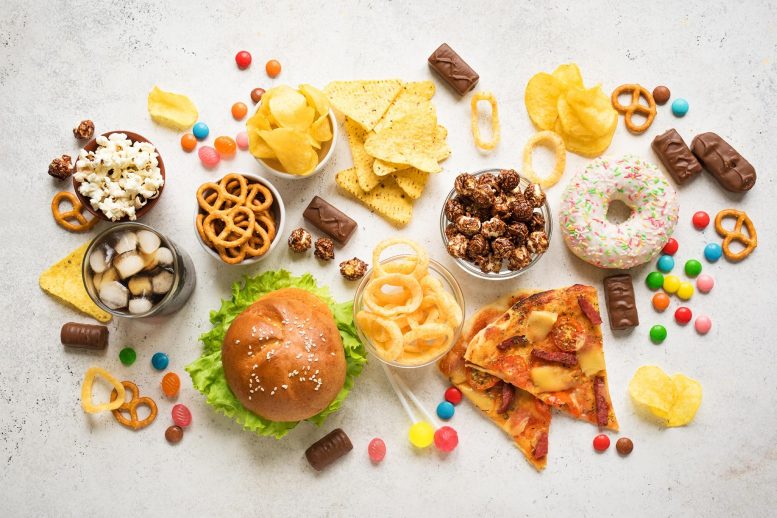
They discovered that substituting ultra-processed foods with healthy foods such as fresh fruit was associated with a 19% decreased incidence of dementia.
The study also found that replacing these foods with healthier options can lower your risk of dementia.
According to recent research published in the journal Neurology, those who consume the highest amounts of ultra-processed foods, such as soft drinks, chips, and cookies, may have a greater chance of developing dementia than those who consume the lowest amount. Researchers also discovered that substituting ultra-processed foods for unprocessed or minimally processed foods in a person’s diet was connected with a decreased risk. The study does not prove that ultra-processed foods cause dementia. Only an association was shown.
Ultra-processed foods are low in protein and fiber and heavy in added sugar, fat, and salt. Soft drinks, salty and sweet snacks, ice cream, sausage, deep-fried chicken, yogurt, canned tomatoes and baked beans, ketchup, mayonnaise, packaged guacamole and hummus, packaged bread, and flavored cereals are some examples of ultra-processed foods.
“Ultra-processed foods are meant to be convenient and tasty, but they diminish the quality of a person’s diet,” said study author Huiping Li, Ph.D., of Tianjin Medical University in China. “These foods may also contain food additives or molecules from packaging or produced during heating, all of which have been shown in other studies to have negative effects on thinking and memory skills. Our research not only found that ultra-processed foods are associated with an increased risk of dementia, but it also found replacing them with healthy options may decrease dementia risk.”
Researchers identified 72,083 individuals for the study from the UK Biobank, a vast database comprising health information on half a million people in the United Kingdom. The study’s participants were 55 years of age or older and did not have dementia at the beginning. They were tracked for an average of ten years. 518 individuals had dementia diagnoses at the conclusion of the research.
Participants in the study completed at least two questionnaires on what they ate and drank the day before. Researchers calculated how much ultra-processed food individuals ate and compared it to the grams per day of other foods to produce a proportion of their daily diet. They then separated the subjects into four equal groups, ranging from the lowest to the greatest percentage intake of ultra-processed foods.
Ultra-processed foods accounted for 9% of the daily diet of people in the lowest group, or 225 grams per day, compared to 28% of the daily diet of those in the highest category, or 814 grams per day. 150 grams was comparable to one serving of pizza or fish sticks. Beverages were the leading food category contributing to high ultra-processed food consumption, followed by sugary goods and ultra-processed dairy.
In the lowest group, 105 of the 18,021 people developed dementia, compared to 150 of the 18,021 people in the highest group.
After adjusting for age, gender, family history of dementia and heart disease, and other factors that could affect the risk of dementia, researchers found that for every 10% increase in daily intake of ultra-processed foods, people had a 25% higher risk of dementia.
Researchers also used study data to estimate what would happen if a person substituted 10% of ultra-processed foods with unprocessed or minimally processed foods, like fresh fruit, vegetables, legumes, milk, and meat. They found that such a substitution was associated with a 19% lower risk of dementia.
“Our results also show increasing unprocessed or minimally processed foods by only 50 grams a day, which is equivalent to half an apple, a serving of corn, or a bowl of bran cereal, and simultaneously decreasing ultra-processed foods by 50 grams a day, equivalent to a chocolate bar or a serving of fish sticks, is associated with 3% decreased risk of dementia,” said Li. “It’s encouraging to know that small and manageable changes in diet may make a difference in a person’s risk of dementia.”
Li noted that further research is needed to confirm the findings.
Maura E. Walker, Ph.D., of Boston University in Massachusetts, who wrote an editorial accompanying the study, said, “While nutrition research has started to focus on food processing, the challenge is categorizing such foods as unprocessed, minimally processed, processed, and ultra-processed. For example, foods like soup would be classified differently if canned versus homemade. Plus, the level of processing is not always aligned with diet quality. Plant-based burgers that qualify as high quality may also be ultra-processed. As we aim to understand better the complexities of dietary intake, we must also consider that more high-quality dietary assessments may be required.”
A limitation of the study was that cases of dementia were determined by looking at hospital records and death registries rather than primary care data, so milder cases may have been overlooked.
Reference: “Association of Ultraprocessed Food Consumption With Risk of Dementia” by Huiping Li, Shu Li, Hongxi Yang, Yuan Zhang, Shunming Zhang, Yue Ma, Yabing Hou, Xinyu Zhang, Kaijun Niu, Yan Borné and Yaogang Wang, 27 July 2022, Neurology.
DOI: 10.1212/WNL.0000000000200871
The study was funded by the National Natural Science Foundation of China.









This study is not important. It is merely a study of correlation and not cause-and-effect. It proves nothing. Common sense alone will tell you that eating better can’t hurt you. This study doesn’t tell you more. One potential facto: Eating healthy food is associated with many other cautious and responsible behaviors. For example, you don’t see many addicts watching their diet.
Agreed, with some explanation. With a family history of dementia preceded with a family history of undiagnosed long-term chronic subclinical non-IgE-mediated food allergies aggravated with added ‘cultured-free’ MSG since 1980 (US) and my personal discovery of the mechanism being calcium deficiency resultant of the body denying and/or robbing the bones, nerves and/or teeth of calcium while trying to maintain the blood at an optimal pH (e.g. about 7.35) with inadequate dietary supplies of calcium, and standard serum testing for calcium being unreliable, allergy related high serum uric acid levels can over tax an older person’s calcium reserves, more so older mothers with low levels of calcium following childbirth.
I concur absolutely. Another name for ultra processed food is what they call” Fast food” lts convenient in working class homes but is very much unhealthy. Even natural food prepared and stored in refrigerator is equally unhealthy and has its own health hazards. We will continue to live with it. But for how long. My Greatest Regards.
Would someone contact my health not brother who for years forced my old mother to not enjoy fast foods and eat only unprocessed healthy foods but she still developed dementia and died horribly because of dementia related reasons and in her autopsy the found her intestines totally blocked with healthy food..
I say hogwash to all this!
Have deodorants, toothpaste, pots/pans, etc containing Aluminum disappeared from the marketplace?
“Processed foods” or “ultra processed food” has no good definition, and thus no good way to measure. And I think it introduces bias against new foods (or foods new to Westerners) vs traditional foods. I think the best measure of “processed” is the amount of Advanced Glycation End-Products (AGEs). Higher levels of these have been associated with a number of aging diseases. These AGEs are created by high temperature cooking, high speed blending, and some fermentation. “Processed food is often cooked at very high temperatures to produce the food at high speed in a factory. Same with blending. Very powerful high-speed blending is done. When scientists bias against modern foods, they may miss that some more traditional foods are highly processed as well, like: butter, peanut butter, roasted nuts, baked chicken, grilled steak, Parmesan cheese. And others are actually still low in AGEs. Most guacamole is still okay…which these researchers did not understand. Some sausage is even reasonably okay. The sausage blended at high speed which is evident by a consistent texture across the cut has the high AGEs. Things like hot dogs and pepperoni. But the lumpy stuff, as long as you boil it, is not too high in AGEs. And you can even get away with some high temperature cooking as long as an acidic sauce is on your meat throughout the cooking process. Marinading, and covering with acidic BBQ sauce can certainly help.
And there is nothing wrong with canned tomatoes or ketchup. The acid reduced the formation of AGEs.
Also, it can be hard to separate people making due, because they don’t remember how to make things from scratch anymore…or don’t have the physical or mental energy to.
Wow! Way too discourage people from even bothering to try. Canned tomatoes? Hummus? Baked beans? And how broad and vague is ‘sweet and salty’ snacks? No distinction between simple home-cooked popcorn, for instance, and Pringles?